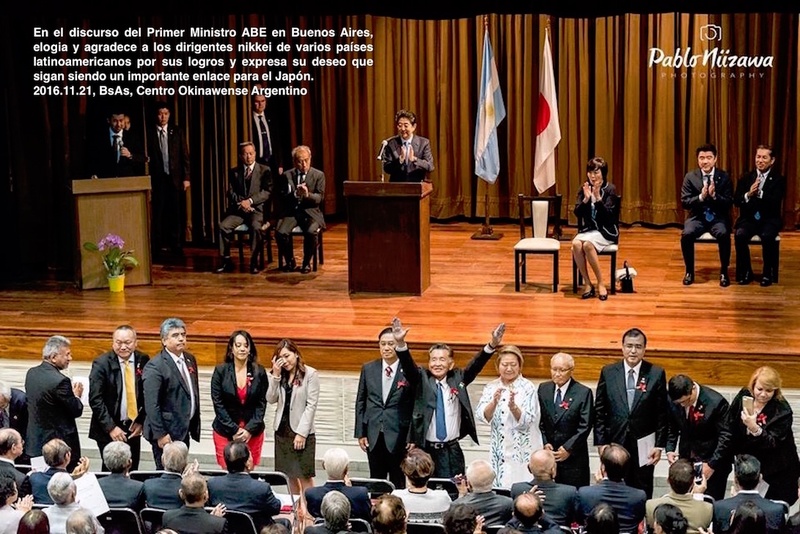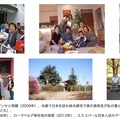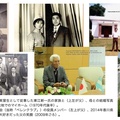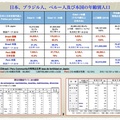Since the inauguration of the second Abe Cabinet at the end of 2012, the Prime Minister has been proactively holding talks with local leaders and people involved in the Japanese community whenever he visits South American countries. At the same time, Japanese embassies and JICA offices have also begun to interact more with Japanese descendants and are seeking ways to strengthen future cooperative relationships. This is because in Latin American Japanese communities, where a generational change is underway, third and fourth generation members often play a leading role, and traditional measures to accommodate Japanese immigrants are limited.1 In 2013, the Ministry of Foreign Affairs resumed the program to invite the next generation of Japanese leaders.2 Japanese bureaucrats and politicians have become aware not only of the current situation and new needs of Latin American Japanese communities, but also of the possibility of deeper collaboration.
Currently, Japanese industries, not only in the manufacturing industry but also in the agricultural and service sectors, are being forced into a situation where they must develop overseas expansion more than ever before. It is not clear whether this sense of crisis in recent years has prompted influential figures in the political and business world to turn their attention to Japanese descendants in Latin America, but there are now moves to make more effective use of Japanese descendants in the expansion of small and medium-sized enterprises and the development of cultural projects.
As hopes for stronger cooperative relations with Japanese descendants grow, on May 9th of this year (2017), the "Council of Experts on Cooperation with Japanese Communities in Latin America" established within the Ministry of Foreign Affairs deliberated for several months on the future of relations with Japanese descendants, and submitted a report containing many proposals to Vice-Minister Sonoura.3 The report also touches on Japanese descendants from Latin America living in Japan, and draws attention to the social advancement of the children of dekasegi workers through higher education, as well as their diversity (language skills, ability to adjust to different cultures) .4 In the future, the possibility of allowing people who do not have Japanese nationality to apply for JICA's "Volunteer Activities for Japanese Descendants" program, for example , is being considered.5
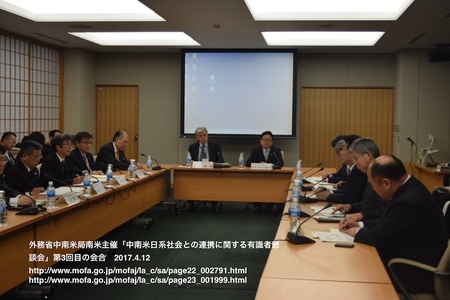
I also attended the third meeting as an expert witness and expressed my opinions mainly on the following three points6 .
1) In the future, it will be necessary to realize more effective cooperative and collaborative relationships with existing influential Japanese people, and in relation to Japan, it will be necessary to be more conscious of not just the Japanese community but the entire society.
Influential Japanese people do not always belong to or are active in Japanese organizations, and in countries with long histories such as Peru and Brazil, most of the influential people there do not speak Japanese and have little contact with Japan. Even so, they often hold considerable positions and influence in society or in the industries they work in. Good examples include political positions as bureaucrats or senior bureaucrats, executive positions in industry associations, university professors and scientists, judicial positions (prosecutors, judges, etc.), and senior members of the military and security authorities.
2) The integration or assimilation of young Japanese into local society should be accepted as a positive factor.
At this conference, it was pointed out that interest in Japan and the Japanese language among young Nikkei people is waning. Although there are differences depending on the country and region, one of the reasons for this is the increase in the rate of marriages with non-Nikkei people as the generational change progresses. This may seem hopeless to the older generation, but on the other hand, it also means that today's young people are assimilating into society, and we need to calmly evaluate the positive aspects of this.
3) It is necessary to value the presence of non-Japanese people who are involved in the Japanese community or participate in various events, and to pay more attention to them so that we can more actively utilize such human resources as a resource for Japan.
In fact, there are many people who are active socially, economically, and politically, and have made great contributions as members of their local communities, even if they have no connection to the Japanese community. The Japanese community can learn a lot from these people, and their influence outside the community will be of great help in strengthening ties with Japan in the future.
Most of the existing Japanese associations and Japanese language schools are now in a situation where they cannot operate financially without the presence of non-Japanese people, and from now on, a more open Nikkei community must be built. Cooperation between Nikkei and non-Nikkei is the key to Nikkei's further social advancement. It is hoped that Japan will continue to cooperate with Nikkei communities while keeping this reality in mind.
It will also be necessary to understand the Nikkei people in regional cities and rural areas who have not had much contact with the main Nikkei organizations in the past, and to seek cooperative relationships with them. In recent years, thanks to social media, it has become easier to understand the existence of such Nikkei people than before. There may be little-known realities of Japanese immigrants there, and learning about their history may lead to new discoveries.
Nikkei communities must not only learn about their own history, but also learn more about Nikkei people who have been active in their communities and non-Nikkei people with ties to Japan, and pass this knowledge on to the next generation. In South America, the number of experience-based training camps run by young Nikkei people and study groups for young entrepreneurs and managers is on the rise. In the future, it will be necessary to invite such role models and expand the know-how and personal connections that can be utilized.7 Japan must also support such efforts and take an attitude of involving such human resources in the development and spread of economic activities and cultural exchanges by Japanese companies.
Notes:
1. Support has been provided to settlements in Paraguay, Bolivia, and the Dominican Republic, where postwar relocation was promoted as a national policy, and those with the self-reliance and financial resources are expected to become important collaborative partners for Japan in further regional development.
2. Alberto Matsumoto, " The Role and Expectations of the Next Generation of Nikkei Leaders ," (Discover Nikkei, June 19, 2015)
3. " Report of the 'Expert Panel on Cooperation with Japanese Communities in Latin America' submitted to State Minister for Foreign Affairs Sonoura (Results) " (Ministry of Foreign Affairs, May 9, 2017)
Report (PDF)
4. Alberto Matsumoto, " The Challenges of Second-Generation Japanese Latinos in Japan ," Discover Nikkei, May 31, 2017.
5. JICA Volunteer Program Website
6. " Results of the Third Meeting of the Expert Panel on Cooperation with Japanese Communities in Latin America " (Ministry of Foreign Affairs, April 17, 2017)
7. Young people in their late teens to mid-twenties are organizing experiential training camps with the support of their seniors. For example, there are groups called Lidercambio in Peru, Dale in Argentina, Vibra Joven in Mexico, and similar youth groups in Paraguay and Brazil. The Japanese government has taken notice of these efforts, and the Ministry of Foreign Affairs has launched a " Latin America Japan Understanding Promotion Exchange Program " called JUNTOS (Together), which allows Japanese young people to participate in some of the programs and visit the countries at public expense.
References:
" Results of the report of the 'Experts' Conference on Cooperation with Japanese Communities in Latin America' submitted to State Minister for Foreign Affairs Sonoura " (Ministry of Foreign Affairs, May 9, 2017) / Report (PDF)
Alberto Matsumoto, " The Role and Expectations of the Next Generation of Japanese American Leaders " (Discover Nikkei, published June 19, 2015)
Alberto Matsumoto, " The Connection Between the Next Generation of Nikkei and Japan: Changes in Nikkei Communities in Latin America" (Discover Nikkei, September 30, 2016)
Alberto Matsumoto, " The Challenges of Second-Generation Japanese Latinos in Japan " (Discover Nikkei, May 31, 2017)
" Policy Speech by Prime Minister Abe at the Latin America Business Seminar " (Prime Minister's Office, August 2, 2014, Sao Paulo, Brazil)
" Speech by Prime Minister Abe at an exchange event with Japanese descendants " (Prime Minister's Office, November 21, 2016, Buenos Aires, Argentina)
© 2017 Alberto J. Matsumoto


